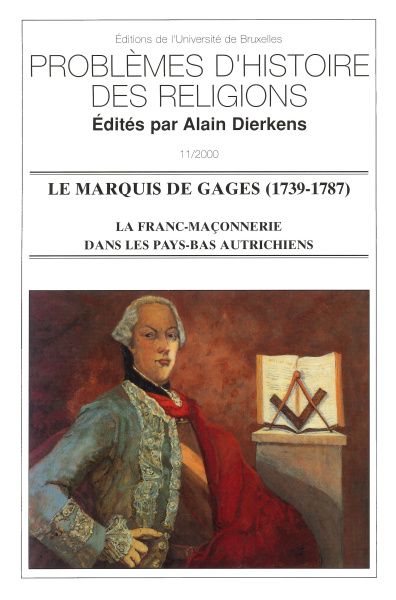Downloads
Le marquis de Gages (1739-1787)
La franc-maçonnerie dans les Pays-Bas autrichiens
First Edition
Edited by Alain Dierkens
Contributions by Hervé Hasquin, Annick Vilain, Pierre-Yves Beaurepaire, Michel L. Brodsky, Pierre Debusschere, Yvan Cancelier, Pierre Cockshaw, Roland Gillard, Jacques Lemaire, Michael Segall, Luc Nefontaine, Baudouin Decharneux, Alain Dierkens
Ce volume réunit les actes d’un colloque international consacré en 2000 à François-Bonaventure-Joseph Dumont (1739-1787), marquis de Gages, et à la franc-maçonnerie dans les Pays-Bas autrichiens.
Specifications
- Publisher
- Éditions de l'Université de Bruxelles
- Edited by
- Alain Dierkens,
- Foreword by
- Alain Dierkens,
- Contributions by
- Hervé Hasquin, Annick Vilain, Pierre-Yves Beaurepaire, Michel L. Brodsky, Pierre Debusschere, Yvan Cancelier, Pierre Cockshaw, Roland Gillard, Jacques Lemaire, Michael Segall, Luc Nefontaine, Baudouin Decharneux, Alain Dierkens,
- Journal
- Problems in Religious History | n° 12
- ISSN
- 07786735
- Language
- French
- Supporting Website
- Oapen.org
- Tags
- environment, European Union
- Publisher Category
- Publishers own classification > History
- BISAC Subject Heading
- HIS037050 HISTORY / Modern / 18th Century
- Onix Audience Codes
- 06 Professional and scholarly
- CLIL (Version 2013-2019)
- 3377 HISTOIRE
- Subject Scheme Identifier Code
- Thema subject category: History
Paperback
- Product Detail
- 1
- Publication Date
- 28 March 2024
- ISBN-13
- 978-2-8004-1858-2
- Extent
- Absolute page count : 582
- Code
- 1858
- Dimensions
- 16 x 24 x 3.3 cm
- Weight
- 922 grams
- ONIX XML
- Version 2.1, Version 3
Google Book Preview
Contents
- Note de l'éditeur | Alain DIERKENS
- L’homme et son temps
- Le marquis de Gages, un aristocrate hennuyer riche et influent | Hervé HASQUIN
- Comment assurer son salut de chrétien et son perfectionnement d’homme?
Le marquis de Gages et la confrérie montoise de la Miséricorde | Annick VILAIN
- Le grand maître marquis de Gages et les relations maçonniques gallo-belges au XVIIIe siècle |
Pierre-Yves BEAUREPAIRE
- Le marquis de Gages et l’Angleterre | Michel L. BRODSKY
- Les « rituels du marquis de Gages » : examen critique
- Rituels et tableaux de la loge « La Vraie et Parfaite Harmonie » à Mons |
Pierre DEBUSSCHERE et Yvan CANCELIER
- Les rituels du marquis de Gages. Examen du manuscrit dans son contexte historique |
Pierre COCKSHAW et Roland GILLARD
- La langue des rituels du marquis de Gages : un idiolecte teinté d’archaïsmes et de
particularismes dialectaux | Jacques LEMAIRE
- Les « rituels du marquis de Gages » : regards anthropologiques et philosophiques
- Les hébraismes dans les rituels du marquis de Gages | Michael SEGALL
- Aspects anthropologiques des rituels du marquis de Gages : initiatIOn masculine et
adoptIon féminine | Luc NEFONTAINE
- Les doctnnes des rituels ou la voie de la prudence | Baudouin DECHARNEUX
- Conclusions : le marquis de Gages et « ses » rituels | Alain DIERKENS

